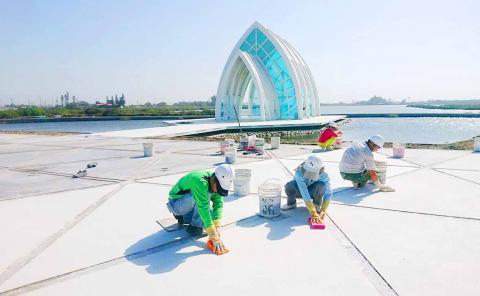Lawmakers yesterday asked the Tourism Bureau to stop funding the construction of artificial tourism facilities and focus on helping local governments attract visitors with unique cultural attractions and specialties.
The nation has many similar artificial tourism facilities, which people often visit only once because of their lack of originality, Democratic Progressive Party (DPP) Legislator Lin Chun-hsien (林俊憲) said at a meeting of the legislature’s Transportation Committee to review the bureau’s budget for next year.
The nation has 80 villages decorated with colorful murals, 13 skywalks and four glass churches, Lin said.

Photo: Yang Chin-cheng, Taipei Times
These places might have drawn huge crowds initially, but public interest quickly fades, he said.
The committee unanimously passed a resolution proposed by Lin to freeze 20 percent of the budget allocated to develop, build and manage national scenic areas.
The budget might be unfrozen after the bureau submits a report on how it plans to address the attractions issue, the resolution says.
With temples across the nation hosting carnivals and pilgrimages year round, the bureau should design package tours featuring traditional religious events and promote them to international tourists, DPP Legislator Yeh Yi-jin (葉宜津) said.
The bureau’s subsidy for religious events could be used to integrate religious activities and local events, such as combining celebrations at Tainan’s Guandi Temple with the Yanshui Beehive Fireworks Festival, she said.
Tourism Bureau Director-General Chou Yung-hui (周永暉) said that the agency would no longer build artificial tourist attractions like skywalks and would next year focus on promoting tours to “special towns.”
The bureau hopes that a “special town campaign” would draw more visitors to destinations in central and southern Taiwan, he said.
The bureau has rejected three applications to build scenic bridges, Technical Division Director Huang Shi-fang (黃勢芳) said, adding that it would no longer fund murals for villages and attractions.
The Directorate-General of Highways would be in charge of building bridges for transportation purposes, Huang said.
The bureau has allocated about NT$1.83 billion (US$59.3 million) to develop, build and manage national scenic areas in the next fiscal year, Huang said, adding that most of the budget would be used to build or maintain tourism facilities.
The funding would be used to market facilities that have already been built, he said.
As some newly elected mayors and county commissioners are looking to increase exchanges with China, the committee asked the bureau to ensure that problems, such as zero or low-cost tour groups, would not recur.
Travel agents offering such tours seek to make a profit by turning them into shopping tours, they said.
The bureau hopes to attract more independent Chinese travelers, while those traveling with groups would be encouraged to join customized and in-depth tours rather than low-cost tours, Chou said.

Chinese spouse and influencer Guan Guan’s (關關) residency permit has been revoked for repeatedly posting pro-China videos that threaten national security, the National Immigration Agency confirmed today. Guan Guan has said many controversial statements in her videos posted to Douyin (抖音), including “the red flag will soon be painted all over Taiwan” and “Taiwan is an inseparable part of China,” and expressing hope for expedited reunification. The agency last year received multiple reports alleging that Guan Guan had advocated for armed reunification. After verifying the reports, the agency last month issued a notice requiring her to appear and explain her actions. Guan

GIVE AND TAKE: Blood demand continues to rise each year, while fewer young donors are available due to the nation’s falling birthrate, a doctor said Blood donors can redeem points earned from donations to obtain limited edition Formosan black bear travel mugs, the Kaohsiung Blood Center said yesterday, as it announced a goal of stocking 20,000 units of blood prior to the Lunar New Year. The last month of the lunar year is National Blood Donation Month, when local centers seek to stockpile blood for use during the Lunar New Year holiday. The blood demand in southern Taiwan — including Tainan and Kaohsiung, as well as Chiayi, Pingtung, Penghu and Taitung counties — is about 2,000 units per day, the center said. The donation campaign aims to boost

The Kaohsiung Tourism Bureau audited six hotels in an effort to prevent price gouging ahead of Korean band BTS’ concert tour in the city scheduled for Nov. 19, 21 and 22 this year. The bureau on Friday said that the audits — conducted in response to allegations of unfair pricing posted on social media — found no wrongdoing. These establishments included the local branches of Chateau de Chine, Hotel Nikko, My Humble House, and Grand Hai Lai, it said, adding that the Consumer Protection Commission would have penalized price gougers had the accusations been substantiated. The bureau said the Tourism Development Act

The Central Weather Administration (CWA) said a magnitude 4.9 earthquake that struck off the coast of eastern Taiwan yesterday was an independent event and part of a stress-adjustment process. The earthquake occurred at 4:47pm, with its epicenter at sea about 45.4km south of Yilan County Hall at a depth of 5.9km, the CWA said. The quake's intensity, which gauges the actual effects of a temblor, was highest in several townships in Yilan and neighboring Hualien County, where it measured 4 on Taiwan's seven-tier intensity scale, the CWA said. Lin Po-yu (林柏佑), a division chief at the CWA's Seismological Center, told a news conference